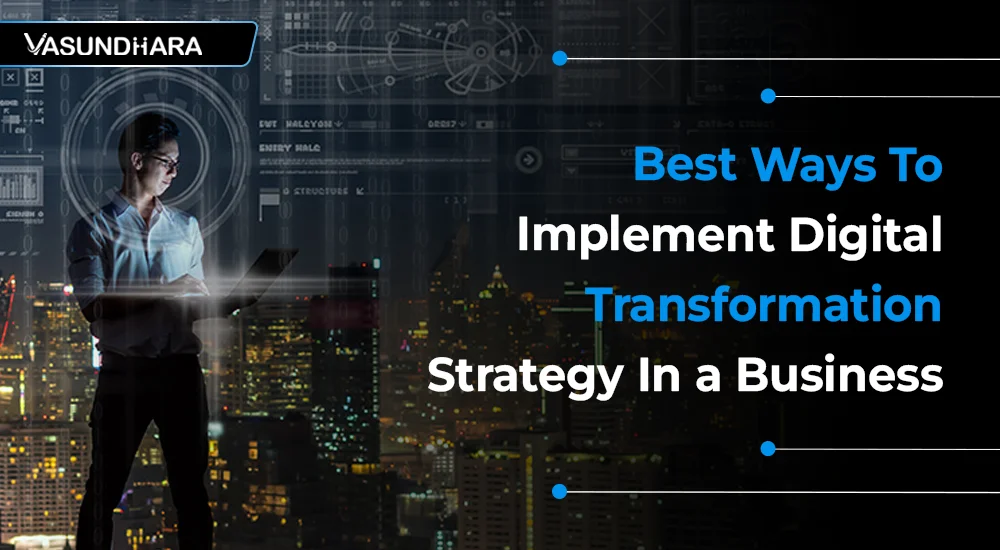Best Ways To Implement Digital Transformation Strategy In a Business


- May 30, 2023




The business world is undergoing rapid change. Those who do not adapt to the changing times will be left behind. Businesses must embrace digital transformation in order to remain ahead of the curve.
Digital transformation is not simply the adoption of innovative technologies; it is also the use of these technologies to innovate and create new business models. It involves making smarter decisions more quickly.
As with all processes that result in significant change, digital transformation can be extremely advantageous for your business. But it is not a simple task.
There will undoubtedly be obstacles along this path if you do not know how to digitize business. Developing a well-thought-out digital transformation strategy will, however, limit surprises and inconveniences.
So today, we’re going to explore all these aspects of digital transformation with you: why is digital transformation, benefits, and ways to apply digital transformation for business success.
Companies must be able to adapt rapidly if they are to survive the constant change in the environment in which they operate.
The digitization of processes and workflows can drive innovation and create previously unexplored competitive advantages.
By utilizing the appropriate digital tools, data extraction and analysis can be made more efficient, resulting in enhanced decision-making, productivity, consumer engagement, and cost savings.
In addition to fostering the adoption of new business models, transforming your company's technology infrastructure may enable you to remain agile and competitive.
The majority of the time, the modern consumer expects a quick, convenient, and individualized experience.
Employ digital solutions such as mobile applications, online purchasing portals, AI-powered chatbots, and interactive websites.
Hire mobile app developers to develop an engaging app for your business that can provide your customers with the individualized interactions they expect.
Without digital transformation initiatives, businesses will struggle to satisfy the convenience and customization demands of their customers.
From startups to mature businesses, there is plenty to be accomplished once your digital transformation activities are done and successful:
Failure to digitize while your competitors have already begun their digital transformation journey risks falling behind.
While your competitors are becoming more lean, making faster choices, and optimizing their processes for optimal efficiency, you may be still utilizing legacy software and obsolete IT infrastructure, which is costing you time and money.
Digital technologies have enabled firms to expand into new markets all around the world.
Many of us already utilize digital communication tools in our daily lives, and they have enabled us to communicate with others in a seamless manner.
A digital transformation within a company would entail utilizing digital technologies, such as communication software, the cloud, the Internet of Things, and other tools that enable remote working, to boost workplace flexibility and the ability to interact effectively from anywhere, at any time.
Using artificial intelligence tools and business process automation relieves employees of monotonous tasks and boosts morale.
By incorporating these technologies into your processes, you demonstrate to your staff that you do not want to burden them with time-consuming manual tasks.
It is advantageous to free up their time so that they can focus on work that demonstrates their value.
The benefit of digitally modernizing your organization is a more productive, effective, and pleased team.

In this day and age of mobile phones, social connectivity, and social media, businesses are becoming increasingly aware of the need of engaging customers.
You can improve your internal and external processes to become more user-centric by becoming a digital firm that leverages technology.
Customers that are engaged are more likely to try a new product, become a reference, or recommend you to their network.
Using a data management solution leads to more informed decisions.
The data generated by digital interactions provides a plethora of insights that will change the way you provide value to your consumers.
You obtain a better grasp of customer expectations when you use analytic tools to gain insight into consumer behavior.
This knowledge can be applied to better digital marketing, content management, company strategy, and business models.
Data analysis power can also be used to produce more precise projections, which will aid in the refinement of your business growth initiatives.
Here're 5 proven ways to help you successfully ideate and implement a digital transformation for your business for optimum growth.
Digital solutions businesses require a more strategic approach to establishing a vision and objectives, as opposed to traditional market-entry strategies, which involve sizing the market, assuming a certain achievable market share, and deriving an opportunity to pursue.
This is a greenfield opportunity to create and monetize new markets, necessitating that companies define their unique strategy and derive the opportunity from that.
Regardless of the architecture a company pursues in its solutions business, the required investment will scale with the number of use cases and level of integration.
Given that the majority of businesses have limited resources, they should pursue solution enterprises where there is a clear strategic fit.
Before pursuing digital opportunities, executives must develop and align on a digital vision for their organization, taking into account both the organization's overall digital strategy and value proposition.
They should begin by evaluating their capabilities, estimating the necessary resources, and considering potential alliances that could assist them in achieving their objectives.
Other practical concerns include the feasibility and prospective value of the proposed initiatives.
When developing the road map, industrial companies should consider the strategic implications for the existing business, including disruptions to offline distribution channels caused by the growth of digital sales.
Transitioning to an agile model necessitates changes at every level. While senior executives may be acclimated to determining strategy on their own, an agile workplace necessitates a collaborative approach and frequent meetings with other managers.
And instead of functions working in isolation, interdisciplinary teams will share information and ideas.
In addition, businesses must create an environment that enables rapid testing of new approaches or technologies, followed by iterative improvements based on consumer feedback, all while managing risks.

New technological capabilities serve as the basis for any digital transformation.
Ideally, industries will describe these capabilities in their road map, providing specific details about various areas, such as commerce backbone services, front ends, integration architecture, front- and back-end integration, digital platforms for development and operations, software as a service, and custom (micro) services.
To facilitate rapid scale-up, businesses should attempt to leverage existing systems when developing new capabilities, rather than completely replacing them.
When mining their data for insights, the majority of industries face a few common obstacles. Many of their data may only be accessible in aggregate form, or there may be inconsistencies in their management and integration of data flows.
The majority of processes, including those that interconnect data, may be hardwired in individual systems with minimal or poor connectivity to others.
Numerous systems only permit batch processing overnight and generate standard reports in Excel or through a cumbersome business intelligence application.
Despite their numerous drawbacks, these legacy technologies and storage systems are expensive.
The digital revolution has fundamentally altered how individuals interact with the world and with one another.
Future technologies such as artificial intelligence, machine learning, and virtual reality are rapidly becoming mainstream products.
Organizations that are versatile and adaptable will be in a better position to seize opportunities and compete in the present and future.
At Vasundhara Infotech, we understand that digital transformation is a process that requires decisive leadership, strategic planning, and a distinct vision.
We work closely with businesses to reorganize their customer journeys, evolve their digital capabilities, and equip their leadership with the framework and tools necessary for continued growth.
So, if you’re unsure about how to hire an offshore developers team? Then, get in touch with our expert team that can help you digitize your business for ultimate success.
We can help you unlock your business's full potential in today's digital landscape. Check out our portfolio to know how we helped companies succeed with digital transformation. .
Contact us today for an expert consultation on digital transformation.
Copyright © 2026 Vasundhara Infotech. All Rights Reserved.